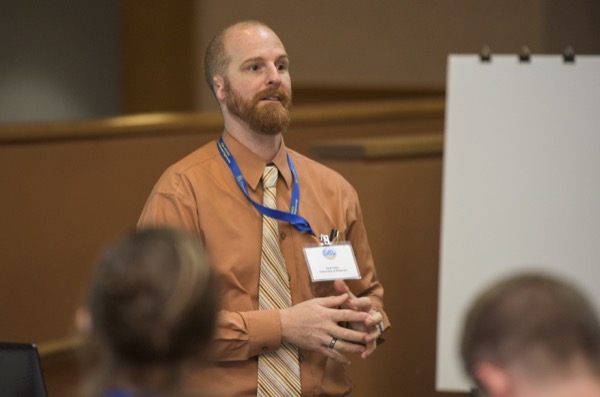Young coastal scientists and engineers share research with peers
More than 60 graduate students, postdoctoral fellows, and early-career professionals shared their research at the Young Coastal Scientists and Engineers Conference-North America on the University of Delaware campus from July 27-29.
Gov. Jack Markell, who welcomed the participants, said the First State was the perfect place for the event.
“Delaware’s coastline is short, only about 26 miles, but it’s very important to our quality of life and our economy,” he said. “People come from all over to enjoy our beaches, and we have some of the cleanest water in the nation. We’ve also seen some of the challenges of managing the impact of storms on our coastal areas.”
Markell joked that after seeing the program agenda, he was pretty sure he wouldn’t understand the science behind the presentations, but he emphasized that the work is very important to policymakers.
Presentation and poster topics ranged from sediment transport, coral reef degradation and tsunami propagation to dune systems, rip currents and beach nourishment programs.
Aimed at stimulating collegial scientific discussion on coastal projects and providing a forum for encouraging feedback, the conference drew participants from as far away as Mexico and Canada.
Vanessa Bennett, a master’s degree student in coastal engineering at Queen’s University in Ontario, appreciated the opportunity to speak to people “who are at her stage in their research as well as others who are ahead and have good advice for those coming through.”
“I certainly made some friends and have walked away with a larger network of peers, which is really important to me,” she said.
Conference organizer Jack Puleo, associate professor in the Department of Civil and Environmental Engineering, encouraged the participants to ask questions, network, provide feedback and have fun.
“Our goal is provide an opportunity for young researchers to present their work and get feedback from their peers in a low-stress, non-intimidating environment,” he said.
Roxanne Carini, who is pursuing a doctorate at the University of Washington, commented that the conference coordinators “facilitated a space for growth.”
“I was proud to take ownership of my research and to practice explaining my results without an adviser around to lean on,” she said. Carini is conducting her doctoral research in the Air-Sea Interaction and Remote Sensing (AIRS) Department of the Applied Physics Laboratory in Seattle.
Conference keynote speakers included Tony Dalrymple of Johns Hopkins University, Jane McKee Smith of the U.S. Army Corps of Engineers and Bill Hanson of Great Lakes Dredge and Dock Company.
Mark Osler of Michael Baker International gave a presentation on professional development, and Chris Kontoes of NortekUSA provided an overview of waves and current measurements.
Prizes were awarded for best poster and best oral presentation based on peer critiques.
The conference series was initiated in the U.K. in 2005 and expanded to North America in 2014.
Funding was provided by UD’s Office of the Provost; the College of Engineering; the Department of Civil and Environmental Engineering; the Center for Applied Coastal Research; the Coasts, Oceans, Rivers and Ports Institute (COPRI); Delaware Sea Grant; Delaware Department of Natural Resources and Environmental Control (DNREC); MARACOOS; NortekUSA; RBR; VTI; Great Lakes Dredge and Dock Company; Coast and Harbor Engineering; and Michael Baker International.
UDaily article by Diane Kukich | Photos by Kathy F. Atkinson

